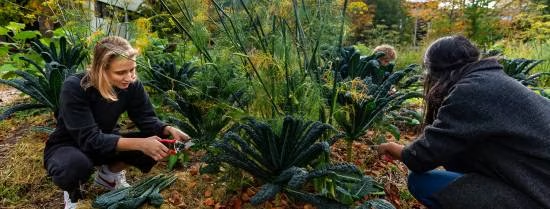Since 2019 the Erasmus university has a special garden on campus. This is not just any ordinary garden. It is full of edible plants; fruits, vegetables and herbs, all planted and maintained by students and staff. We even have our own bee palace. We are very proud to say that everything here is grown according to principles of natural or sustainable farming.

Edible EUR
The vision of Edible EUR is students and staff growing natural food all over and around campus whilst enriching the local ecosystem. To achieve this, the garden inspires, informs, and activates about the application of natural farming on and around campus.
For more information or questions:
Gardening: Facebook
Instagram: @edible_eur
E-mail: edibleeur@eshub.nl

Bee the Change
Students take care of the campus bees together with the beekeeper of Immeke Bee the Change. We promote the survival of the bee. Bees and people have been interconnected and interdependent for centuries. More than ever bees show us that they are more than just makers of honey. Bees are an example how to treat our own environment and even how to treat each other. Bee the change and come and tell the story of the bees with us! We inspire, build, amaze and share knowledge around the campus.
Beekeeping: Facebook
Instagram: @bee_the_change.nl
"By organising a great diversity, we are looking for a natural balance between plants and animals."
Natural Farming
Natural farming is about feeding the world while enriching its ecosystems. Various farmers across the world have developed their own style of farming naturally, but some practices are commonly shared. By always keeping the soil covered with living or dead organic material, it remains protected and feeds soil life. By mixing a variety of crops, and keeping some wild plants, diseases are suppressed. By implementing more shrubs and trees, a network of deep roots is established, while providing habitat high above ground. By not plowing, not spraying any chemicals, and not using artificial fertilizers, soil life is allowed to fully develop and take over most of the hard work.
Agriculture
Agriculture covers more than 50% of all habitable land, dominating the composition of ecosystems on land. Monocultures, heavy machinery and agrochemicals have an enormous detrimental impact on those ecosystems. The way we grow our food shapes the ecosystems on this planet and directly around us.
Value
Bees and other insects have an enormous economic value. Without them there would hardly be any harvest. The bees teach us that the economy is not just about money, but about the value of the ecosystem. By organizing a great diversity, we are looking for a natural balance between plants and animals. Sustainable and diverse without artificial additives. We believe that a healthy diverse ecosystem and productivity can go very well together.
Get involved
To harvest and eat from a garden is very rewarding, especially after all the work put in. Hungry for that juicy fresh natural bounty? Maybe you can get involved!
Develop skills and knowledge in natural farming or beekeeping? Earn fresh natural produce? Meet new friends? You are very welcome to join the weekly gardening or beekeeping sessions. No registration, experience or materials required.
Find the schedule for our sessions on the website of the Erasmus Sustainability Hub.
Sustainability: things you can do yourself
Nine tips for a sustainable lifestyle
Erasmus Sustainability Hub
Making a meaningful difference in the university community
LDE Centre for Sustainability
Three universities joining forces to stimulate a circular economy
